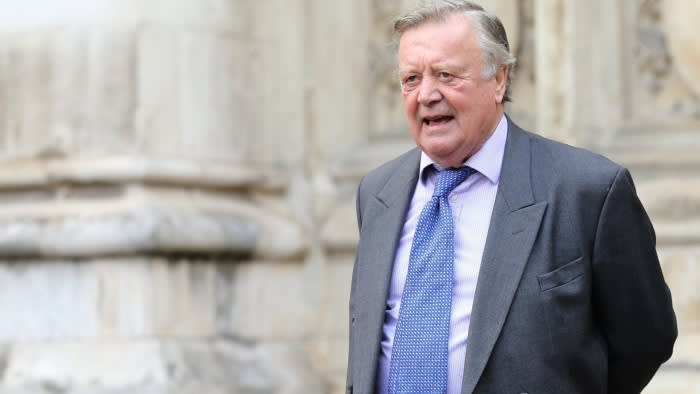Lord Ken Clarke, former Conservative chancellor, has warned that an incoming Labour government would face the biggest set of problems of any new UK administration since the second world war.
Clarke, who handed over a booming economy to Sir Tony Blair’s New Labour in 1997, said the circumstances today were completely different, given the sluggish domestic economy and multiple international crises.
“This is the worst combination of problems at home and abroad that any government will have taken on since the second world war,” he told the Financial Times in an interview.
“The comparison I always make is with 1979 when we took over an economy in a disastrous state after the ‘winter of discontent’,” he added, referring to the wave of strikes that overwhelmed James Callaghan’s dying Labour government.
Clarke said that current Tory chancellor Jeremy Hunt was doing the right things but that a combination of “appalling” UK productivity growth, low business investment, strained public services and global instability were all serious problems.
“I don’t think there will be an automatic bounceback — no,” he said. Clarke said that Britain, like other western economies, had borrowed and spent too much in recent years, leaving little room for fiscal manoeuvre.
In 1997, Clarke handed over an economy growing at 4 per cent to his Labour successor, Gordon Brown. By contrast, Britain’s economy slipped into recession at the end of last year, although the latest official data released on Friday raised the prospect it would return to growth in the first quarter. The Office for Budget Responsibility forecasts growth of 0.8 per cent this year and 1.9 per cent in 2025.
Clarke said he was “surprised” at recent comments by Lord Nick Macpherson, former Treasury permanent secretary, that this year’s contest would be a “good election to win” and that economic gloom had been overdone.
Labour officials privately admit that Hunt and Prime Minister Rishi Sunak have stabilised the economy over the past 18 months and gaps between the two parties over their economic approach have been closing.
Rachel Reeves, shadow chancellor, has accepted almost all the measures in Hunt’s two recent fiscal statements — including a 4 percentage point cut in national insurance — while Hunt has copied Labour’s plans to crack down on tax breaks for “non-doms” and maintain a windfall levy on the oil and gas sector.
Clarke says Reeves’ attempt to narrow differences with the Conservatives — closing down potential Tory attacks in the election campaign — echoed New Labour’s decision to copy his tight spending plans ahead of Blair’s landslide victory in 1997.
“Rachel Reeves and Jeremy Hunt are in the same situation now as Gordon Brown and Ken Clarke in 1997,” he said, adding that in both cases, Labour wanted to build on foundations laid by Tory chancellors.
Clarke said that the travails facing the British economy were not the fault of Hunt, who he said was delivering sensible reforms and was “fending off the madder demands of his colleagues” to introduce big income tax cuts.
“Similarly Rachel does seem to be keeping the Labour party broadly under control,” he said, adding that she and Hunt seemed to agree on the need to boost investment and productivity, supporting new industries and increasing skills.
Clarke, chancellor in Sir John Major’s government from 1993 to 1997, oversaw a return to strong growth and low inflation after the debacle of Black Wednesday, the 1992 sterling crisis when Britain was ejected from the European exchange rate mechanism.
He said he concentrated on economic basics and did not hold a “pre-election Budget or any other rubbish like that”. Hunt is eyeing a possible tax-cutting Autumn Statement before the election with Labour leading the Tories by an average 20-points in the opinion polls.
Asked whether he resented the fact he had left a strong economy to his political opponents in 1997, he said: “Not particularly. Blair and Brown were responsible men. By and large, the Blair government wasn’t too bad.”
He said that in the run-up to the 1997 election, the Conservatives retained a lead over Labour on the economy, even if his party — riven by divisions over EU membership and hit by scandal — trailed on most other measures.
“Tony Blair and Gordon Brown disarmed that by making a point of saying they were going to stick to my figures after the election,” he said.
He said he was surprised that his Labour successor stuck to his spending plans for two years, even though Clarke said he intended to review them after 12 months. After that, Brown turned on the spending taps.
The Clarke-Brown chancellorships, spanning almost 15 years, marked what Clarke calls “the great normality”, which came juddering to a halt “when everyone got reckless” and the financial crash hit in 2008.
In contrast to the run-up to the 1997 election, the Conservatives trail Labour on economic competence in the opinion polls. But Reeves is determined to stress to voters that her party would deliver some continuity if it wins the election. “Stability is change,” said one Labour official.
“Jeremy Hunt and Rachel Reeves are very similar,” Clarke said. “The big difference is that I handed over to Gordon the healthiest economy we had had since the war.”

